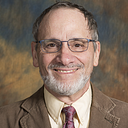Mendel Letters 116 — Plato and Mr. Eisenstein
February 25, 2023
Dear Mendel,
In December 1977, New York Times columnist Francis X. Clines somehow came to interview the United Community Centers director Morris Eisenstein for his column “About New York.” People at the Center were furious about the article Clines titled “Plato and Mr. Eisenstein in Brooklyn.” I think the problem was that the article cut too close to home.
https://www.nytimes.com/1977/12/22/archives/about-new-york-plato-and-mr-eisenstein-in-brooklyn.html
You know Morris and I had a very antagonistic relationship so I was never invited to inner sanctum staff meetings. For many years I was involved in the community center despite him, not because of him. In the late 1970s I believed the Center had an interracial core leadership group and a model for community organizing that could be a force for progressive change in the city and maybe even in the country. But that’s another story.
Clines opened the column describing some of the hardships in communities like East New York, Brooklyn and he closed citing the Center and it programs for offering a ray of hope in dismal times. But the middle of the column, that’s where he captured the idiosyncrasies of Mr. Eisenstein, who preferred to be called Morris.
A staff meeting was underway at the Centers’ Van Siclen Avenue storefront when Clines visited. In the middle of a meeting discussing strategies to force the community school board to open up board meetings for public scrutiny, Morris answered the phone and started to scream at a contractor doing work at the Centers’ day care building. Cline commented, Mr. Eisenstein seemed “happier for having hollered,” which pretty much captured how Morris often behaved at meetings. He liked to yell, “Listen to what I’m saying, not how I say it,” as if somehow it was possible, while cowering, to separate the tirade from any buried nuggets of wisdom.
Returning to the meeting, Morris launched into a diatribe about failing schools and the inadequacies of the School Chancellor, a man who made him “want to vomit.” From somewhere out in leftfield, a “scowling” Morris charged, “It’s as if Plato woke up yesterday and was saying these things through the mouth of Anker. The ideas of Plato and Aristotle are running our lives today.”
Clines claimed that a “continuing contention at the center — that the Platonic concept of the ideal, of immutable, eternal, pre‐set definitions of life, is at the heart of modern notions of writing off a whole urban generation.” Now I know Morris never said anything like that, and I never believed we were trapped in ideas espoused by ancient Greek philosophers, but that Clines understood Morris’ argument that way is not completely surprising.
Morris frequently argued based on deeply held principles, something I also valued, but Center debates tended to delve into an abstract examination of ideas, not a careful analysis of what was going on in the community and world. Clines pointed out in the column that when the Center was founded, “the area was 90 percent white, with sizable Jewish communities in particular, and 10 percent minority.” However, by the late 1970s, East New York was 90% Black and Latino. Sadly, as long as Morris was director, there was never discussion of how the demographic shift needed to impact on Center policies and programs.
Clines described Morris as the “strangest sort of urban Renaissance man,” but what I think really raised people’s ire was when Clines labeled the Center’s commitment to racial integration as a “proud if dated banner.”
Morris Eisenstein died less than two years later and a new generation that included me took over the leadership of United Community Centers. We never did create the social movement that I dreamed was possible, but more than four decades later, the Center still provides valuable services to the people of East New York, Brooklyn.
Your son
Hard copies of these typed letters were discovered in an old camp trunk in the basement storage facility of one of the few buildings that remain standing in this Brooklyn neighborhood. The building is quite decrepit and is scheduled for demolition. The letters were found in November 2048 by a teenager who believes they were written by his great-grandfather. The letters are addressed to Mendel, the letter writer’s father, who appears to have been dead for at least six years when his son, whose name we are unsure of, started to write him. The son appears very agitated in some of the letters. With permission from the family, we are publishing them on the date they were written, only 28 years later.
